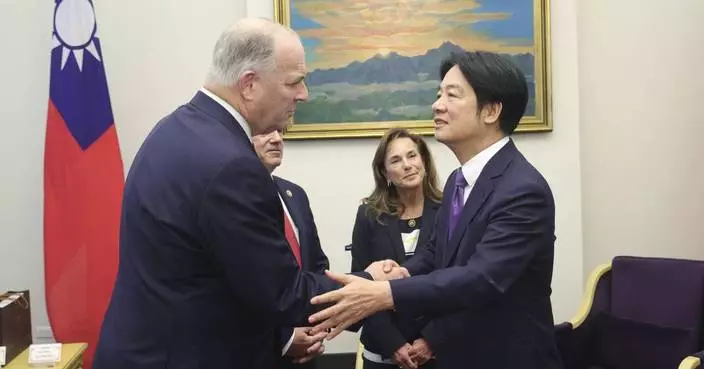Investors and China watchers welcomed President Xi Jinping's pledge Tuesday to open his country's market wider to foreign competition, hoping it will ease a trade dispute with Washington that has unsettled financial markets and could jeopardize a global economic expansion.
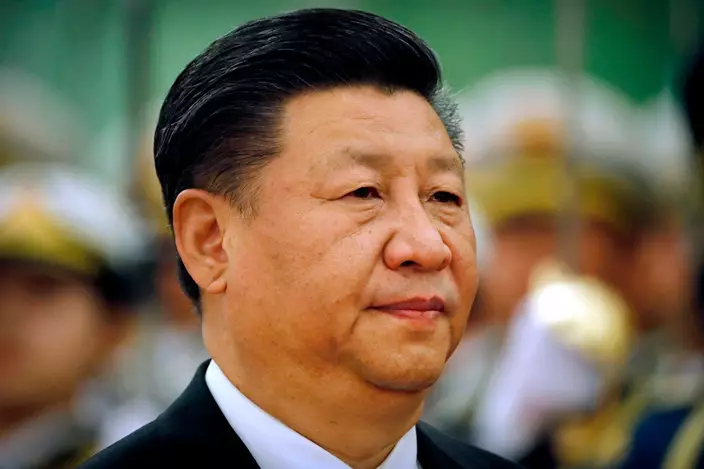
FILE - In this March 29, 2018, file photo, Chinese President Xi Jinping reviews an honor guard during a welcome ceremony at the Great Hall of the People in Beijing. (AP Photo/Mark Schiefelbein, File)
Xi's vow to cut Chinese auto tariffs, allow more competition in banking and better protect intellectual property calmed investors who have been on edge since the world's two biggest economies last week announced plans to slap tariffs on $50 billion worth of each other's products.
Click to Gallery
Investors and China watchers welcomed President Xi Jinping's pledge Tuesday to open his country's market wider to foreign competition, hoping it will ease a trade dispute with Washington that has unsettled financial markets and could jeopardize a global economic expansion.
Xi's vow to cut Chinese auto tariffs, allow more competition in banking and better protect intellectual property calmed investors who have been on edge since the world's two biggest economies last week announced plans to slap tariffs on $50 billion worth of each other's products.
At the same time, Ezell and other longtime China observers cautioned that Beijing has promised in the past to open its market and curb hardball tactics to acquire foreign technology without following through on those pledges.
Within hours, Beijing counterpunched with similar plans to impose tariffs on $50 billion in American products, including soybeans and small aircraft. Then, Trump ordered the U.S. trade representative to consider another $100 billion in Chinese imports to tax.
Still, Sarah Huckabee Sanders, the White House press secretary, told reporters that "we want to see concrete actions from China, and we're going to continue moving forward in the process and in the negotiations until those happen."
Stock markets rallied worldwide on optimism for relief from what has become the most high-stakes trade confrontation since World War II. The Dow Jones industrial average was up more than 400 points in early afternoon trading.
"This is a promising signal that there can be a path forward to address (America's) concerns without a full-on trade war emerging," said Stephen Ezell, vice president of global innovation policy at the Information Technology & Innovation Foundation, a think tank that has criticized both China's aggressive trade practices and President Donald Trump's confrontational response to them.
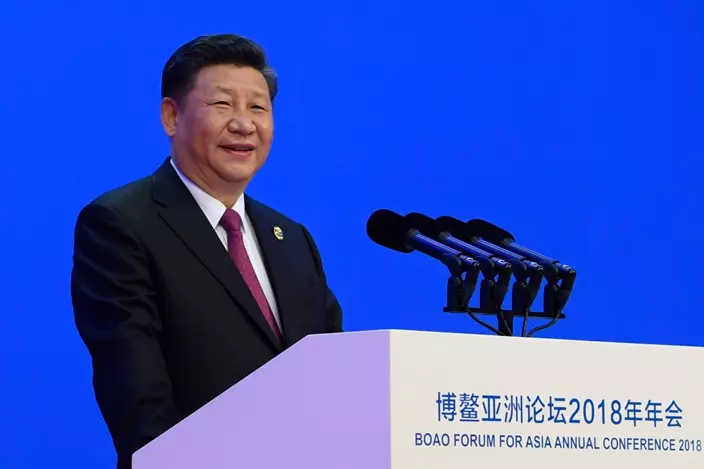
In this photo released by Xinhua News Agency, Chinese President Xi Jinping delivers his opening speech at the Boao Forum for Asia Annual Conference in Boao in south China's Hainan province, Tuesday, April 10, 2018. (Li Xueren/Xinhua via AP)
At the same time, Ezell and other longtime China observers cautioned that Beijing has promised in the past to open its market and curb hardball tactics to acquire foreign technology without following through on those pledges.
"This is positive, but we need to see action," Ezell said.
Speaking at a business conference Tuesday, Xi didn't directly mention either Trump or the trade standoff with the United States. He promised progress on areas that are U.S. priorities, including opening China's banking industry and boosting imports to China. He did not, however, address some key irritants for Washington, including a requirement that foreign companies work through joint ventures that require them to give technology to potential local competitors.
Last week, the Trump administration unveiled plans to impose tariffs on 1,300 Chinese products, worth about $50 billion a year in imports to the United States. It characterized those tariffs as a penalty for Beijing's forcing American companies to hand over technology to gain entry to China's market.
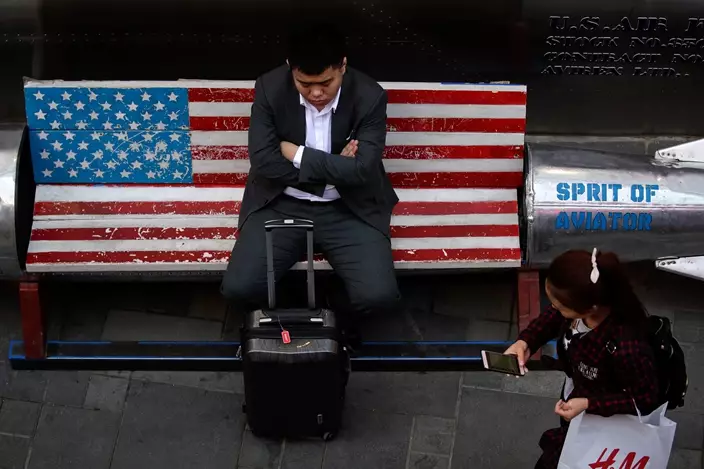
A woman walks by a man sitting outside an American apparel store at a shopping mall in Beijing, Tuesday, April 10, 2018. (AP Photo/Andy Wong)
Within hours, Beijing counterpunched with similar plans to impose tariffs on $50 billion in American products, including soybeans and small aircraft. Then, Trump ordered the U.S. trade representative to consider another $100 billion in Chinese imports to tax.
David Dollar, senior fellow at the Brookings Institution, noted that the United States won't impose its tariffs until after it gives the American public weeks to comment on the plans. That leaves time for the two countries to negotiate.
"You hope that reason prevails," said Dollar, a former official at the World Bank and U.S. Treasury Department. "Every time the administration talks tough, the market drops. And every time the administration says 'We're going to negotiate' the market goes back up."
"The Chinese are not going to make overwhelming changes in the next 60 days," Dollar added. "But maybe the Chinese will agree to a few things, and the Trump team will be able to declare victory."
Trump himself tweeted Tuesday that he was "very thankful" for Xi's comments and praised the Chinese president's "enlightenment."
"We will make great progress together," Trump added.、
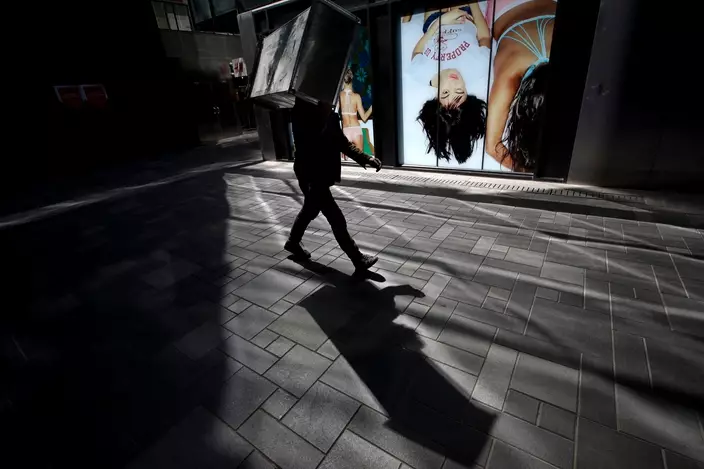
A man carries a container past the global fashion chain stores at a shopping mall in Beijing, Tuesday, April 10, 2018. (AP Photo/Andy Wong)
Still, Sarah Huckabee Sanders, the White House press secretary, told reporters that "we want to see concrete actions from China, and we're going to continue moving forward in the process and in the negotiations until those happen."
With his promises Tuesday, Xi sought to position China as a defender of free trade and cooperation despite its being the world's most-closed major economy. He hopes to contrast his softer stance with Trump's "America First" approach, which has focused on restricting imports and renegotiating trade agreements to win better terms for the United States.
"China's door of opening up will not be closed and will only open wider," Xi said at the Boao Forum for Asia on the southern island of Hainan.
Xi said Beijing will "significantly lower" tariffs on auto imports this year and ease rules that limit foreign global automakers to owning no more than 50 percent of joint ventures in China.
He promised to encourage "normal technological exchange" and "protect the lawful ownership rights of foreign enterprises."
Rajiv Biswas, an economist at IHS Markit, said, "This would be a victory for the world trading system and an important step away from the abyss of rising global protectionism."
The dispute is likely to end "with a concession from China," said Larry Hu of Macquarie Group in a report.
Skeptics pointed out that China has made promises before and then not adhered to them.
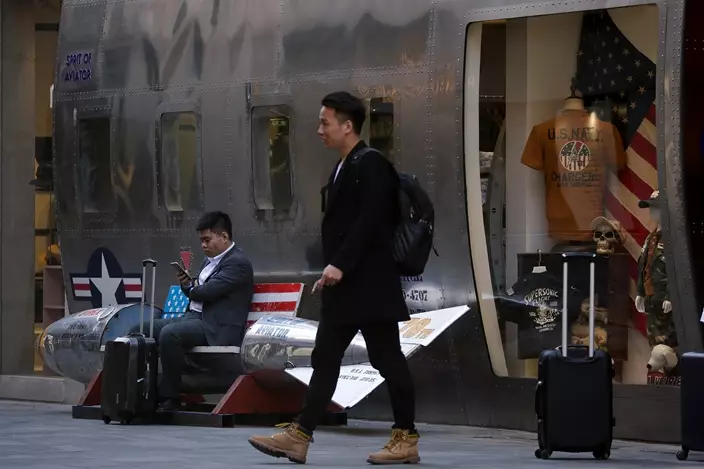
People spend their time outside an American apparel store at a shopping mall in Beijing, Tuesday, April 10, 2018. (AP Photo/Andy Wong)
The Office of the U.S. Trade Representative noted in a report in January that "China repeatedly failed to follow through" on commitments it made in U.S.-China dialogues. In 2010 and 2012, for instance, China declared that foreign companies were free to decide for themselves when to share technology with Chinese partners or other businesses. Instead, the report found, Chinese regulators "continue to require or pressure foreign companies to transfer technology as a condition for securing investment or other approvals."
Also Tuesday, China filed a challenge with the World Trade Organization against Trump's earlier tariff increase on steel and aluminum in a separate dispute. Beijing, which has issued a $3 billion list of U.S. goods including pork and apples for possible retaliation, requested 60 days of consultations. If that fails, China can ask for a ruling from a WTO panel.
But the stakes are higher in the dispute over China's aggressive technology policies. Chinese officials deny that they compel foreign companies to hand over technology. But business groups from outside China argue that joint venture and licensing rules make coerced transfers of technology unavoidable.
Xi gave no details on how conditions might change, leaving unclear how he intends to mollify Washington.
Still, Ezell said he thought Xi's speech suggests that Trump's aggressive moves might be working. Trump has "demonstrated a resoluteness, and that signals to China's leaders that we're serious."
WASHINGTON (AP) — TikTok is gearing up for a legal fight against a U.S. law that would force the social media platform to break ties with its China-based parent company, a move almost certainly backed by Chinese authorities as the bitter U.S.-China rivalry threatens the future of a wildly popular way for young people in America to connect online.
Beijing has signaled TikTok should fight what it has called a “robbers” act by U.S. lawmakers “to snatch from others all the good things that they have.” Should a legal challenge fail, observers say Chinese authorities are unlikely to allow a sale, a move that could be seen as surrendering to Washington.
Beijing may not want the U.S. action against the popular short-form video platform to set a “bad precedent,” said Alex Capri, senior lecturer at the National University of Singapore and research fellow at Hinrich Foundation. “If Beijing capitulates to the U.S., where does it end?”
The legislation that U.S. President Joe Biden signed this week could allow Washington to widen its scope to target other China-related apps, such as the popular e-commerce platform Temu, and embolden U.S. allies to follow suit, said Hu Xijin, a former editor-in-chief for the party-run newspaper Global Times.
With 170 million American users, TikTok should “have more guts to fight to the very end and refuse to surrender,” Hu, now a political commentator, said Wednesday on Chinese social media.
TikTok vowed to challenge the new U.S. law, which requires its Beijing-based parent company, ByteDance, to divest its stakes within a year to avoid a ban. The company has characterized the law as an infringement on the free speech rights of its users, most of whom use the app for entertainment.
“We believe the facts and the law are clearly on our side, and we will ultimately prevail,” the company wrote on the social platform X.
The fight over TikTok has increased tensions between the U.S. and China, with both vowing to protect their economic and national security interests. U.S. lawmakers are concerned the Chinese ownership of the app could allow Beijing to exert unwanted influence in the U.S., especially on young minds. The law has followed a string of successes by Washington in curbing the influence of Chinese companies through bans, export controls and forced divestitures, drawing protests from Beijing that the U.S. is bent on suppressing China’s rise through economic coercion.
The U.S. has forced other Chinese companies to divest before, including in 2020, when Beijing Kunlun, a Chinese mobile video game company, agreed to sell the gay dating app Grindr after receiving a federal order. But TikTok, created by a Chinese company only for the overseas market and evidence of the nation's tech powers on the global stage, is a high-profile case that Beijing does not want to lose.
National dignity is at stake and could “take precedence over the financial interests of ByteDance investors,” including global investors who own 60% of the company, said Gabriel Wildau, managing director of the New York-headquartered consulting and advisory firm Teneo.
A legal challenge from the company is expected to lean on First Amendment concerns and could drag on for years. Beijing is betting on a legal win, analysts say.
What to do if TikTok doesn't prevail is likely still being debated with the Chinese leadership, said Dominic Chiu, an analyst with Eurasia Group. President Xi Jinping, who will have to sign off on whether to permit or prohibit the sale, probably has not made the final decision, Chiu said.
Luckily for Xi, there is no urgency for Beijing to decide, said Sun Yun, director of the China program at the Washington-based Stimson Center. “A lot of things could change," she said.
If lawmakers get their wish and a sale does occur, it’s likely to be a challenging and messy process for TikTok, which would have to disentangle its U.S. operations from everything else.
For one, the price tag for TikTok’s U.S. business — which is unknown — is expected to be high enough to severely limit the pool of investors and companies who’d be able to afford it. Some investors — including former Treasury Secretary Steve Mnuchin — have already positioned themselves as potential buyers of a U.S. version of TikTok. ByteDance, which is privately held, is valued at $220 billion, according to market tracker Pitchbook.
And there’s uncertainty about what would happen with the TikTok algorithm, the secret sauce that feeds users short videos based on their interests and has contributed to the platform’s status as a cultural juggernaut.
ByteDance would be barred from controlling the algorithm of a U.S. spinoff of TikTok. Many experts believe Chinese authorities would block any sale of the technology that populates people's TikTok feeds under export regulations revised in 2020, when then-President Donald Trump unsuccessfully tried to ban TikTok through an executive order that was blocked in federal courts.
Some, including Mnuchin, have said TikTok would need to be rebuilt in the U.S. using new technology. But it's unclear what that might look like, or how well it can reproduce the type of video recommendations users have grown accustomed to seeing.
Robin Burke, a professor of information science at the University of Colorado Boulder, says some aspects of the algorithm might be replicated by industry insiders. But he also noted there are areas where TikTok appears ahead of its competitors and duplication might prove challenging.
“TikTok has all the experience, they have all the data,” Burke said. “I think it’s unlikely that a U.S. business — if they don’t inherit the technology from the parent company — would be able to build something equivalent. Certainly not right away.”
AP journalist Dake Kang contributed from Beijing.
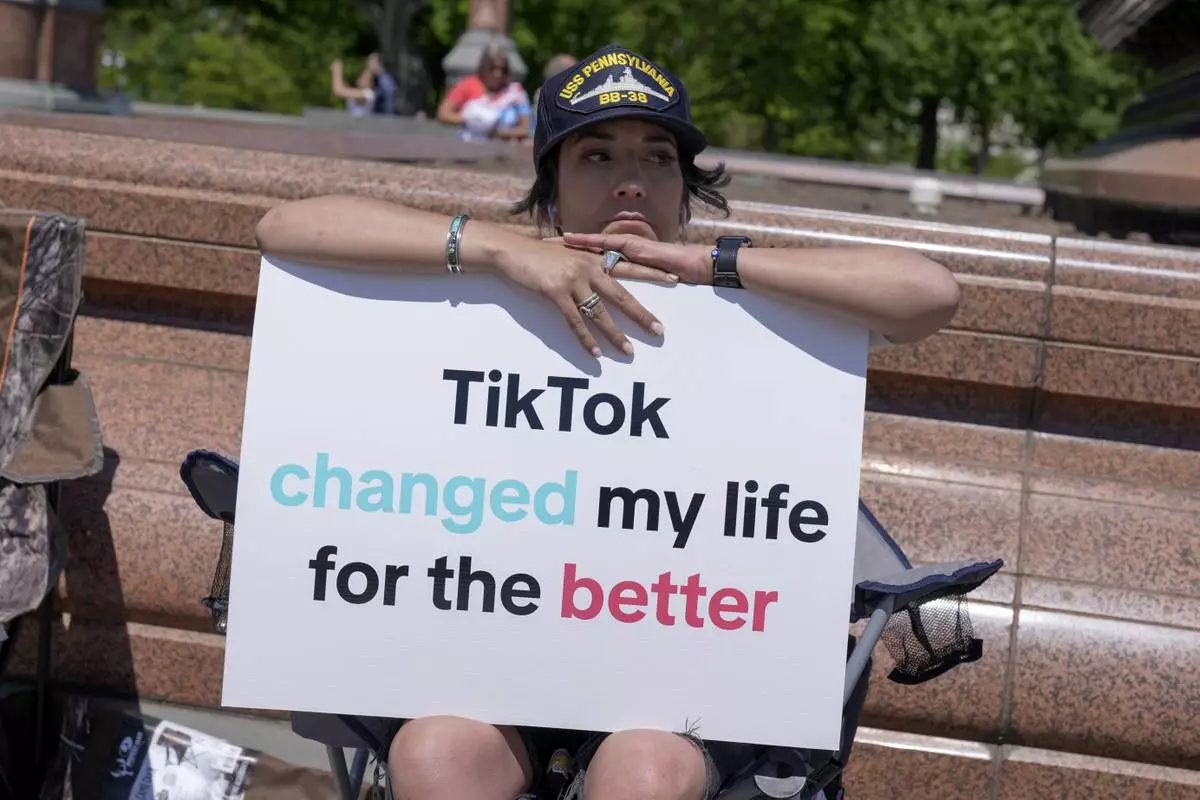
FILE - A TikTok content creator, sits outside the U.S. Capitol, April 23, 2024, in Washington. TikTok is gearing up for a legal fight against a U.S. law that would force the social media platform to break ties with its China-based parent company or face a ban. A battle in the courts will almost certainly be backed by Chinese authorities as the bitter U.S.-China rivalry threatens the future of a wildly popular way for young Americans to connect online. (AP Photo/Mariam Zuhaib, file)

FILE - The TikTok logo is displayed on a mobile phone in front of a computer screen, Oct. 14, 2022, in Boston. TikTok is gearing up for a legal fight against a U.S. law that would force the social media platform to break ties with its China-based parent company or face a ban. A battle in the courts will almost certainly be backed by Chinese authorities as the bitter U.S.-China rivalry threatens the future of a wildly popular way for young Americans to connect online. (AP Photo/Michael Dwyer, File)















